Oct 28, 2025 10:47 AM
In Memoriam: Jack DeJohnette, 1942–2025
Jack DeJohnette, a bold and resourceful drummer and NEA Jazz Master who forged a unique vocabulary on the kit over his…
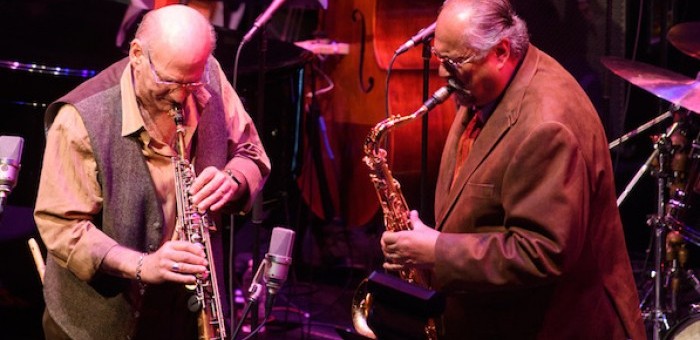
Dave Liebman (left) and Joe Lovano pay tribute to their friend and colleague, the late Michael Brecker, at Jazz at Lincoln Center on Jan. 25.
(Photo: Brian Hatton )On Jan. 25, 10 years and 12 days after the iconic tenor saxophonist Michael Brecker died of myelodysplastic syndrome, hundreds of oncologists, colleagues and fans—the latter category included Hillary Rodham Clinton and her husband—packed the Appel Room in the Jazz at Lincoln Center complex at Columbus Circle in Manhattan for an all-star concert in honor of his memory.
Proceeds from the concert were targeted to support cancer research at Columbia University Medical Center (CUMC) and the work of doctors Azra Raza and Siddhartha Mukherjee. Dr. Raza is director of the Myelodysplastic Syndromes (MDS) Center at CUMC. Dr. Mukherjee is a physician and researcher at the MDS Center who won the Pulitzer Prize for The Emperor of All Maladies: A Biography of Cancer (Scribner), and has a new best-seller, The Gene: An Intimate History (Scribner).
In her welcome address, Dr. Raza fulfilled her stated imperative of emulating “a woman’s dress—long enough to cover the subject; short enough to be interesting.” She thanked Secretary Clinton for her “unimaginable grace,” then mentioned that she herself had lost her husband—a blood cancer specialist—to the same disease that claimed Brecker’s life.
The evening’s first group—tenor saxophonist Chase Baird, pianist Andy Ezrin, guitarist Nir Felder, bassist James Genus, and drummer Rodney Holmes—took the bandstand and launched a straight-eighth original by Baird titled “Ripcord,” on which the composer improvised with a big, round, Brecker-influenced tone.
When he finished, Baird, 28, mentioned that hearing Brecker as a 12-year-old in Salt Lake City “changed my life.” At 14, Baird continued, he’d sent Brecker a tape. Brecker responded and, when the saxophonist came through Salt Lake City on tour with Herbie Hancock’s New Directions band, invited the youngster to join him for the day. “Michael taught me that you work your ass off every time,” Baird said.
The concert’s music director, electric bassist Will Lee, took the mic and introduced Wynton Marsalis. As drummer Jeff “Tain” Watts switched places with Holmes, Marsalis said: “Michael was such an exemplary hero of our music. I love to see different communities come together.” There commenced a burning version of Marsalis’ default jam session tune, “Cherokee,” which Marsalis, perhaps bothered by a balky monitor, played from the front of the stage, without a microphone.
Still, every note came through with clarity in a performance notable for the telepathic rhythmic interplay between long-time partners Marsalis and Watts, whose drum kit postulations, virtuosic and functional, integrated elements of Roy Haynes, Billy Higgins and Elvin Jones into his own singular voice.
Robert Glasper assumed the piano bench as Dianne Reeves then took the stage. The vocalist snapped off a slow drag in four, Tain following with swirling brushes. Reeves vocalesed abstractly into the lyric of “Skylark” before the band lost the thread at “meadow in the midst.” After two more tries, Reeves made lemonade out of lemons. She said, “I’ve got a better idea,” counted off a medium shuffle, and scatted some blues, morphed into extemporaneous vernacular lyrics like “If I’m feelin’ tomorrow like I feel today,” and scatted informed exchanges with Marsalis.
After Marsalis exited, Reeves sang Stevie Nicks’ “Dreams” to a bespoke Glasper arrangement, followed by a lovely Glasper solo, as they did on Reeves’ 2014 release, Beautiful Life.
Ezrin returned to play with the group Saxophone Summit, comprising Dave Liebman and Joe Lovano, who co-founded the group with Brecker at the end of the 1990s, and Ravi Coltrane, Brecker’s successor in the band.
After Liebman addressed President Clinton with the information that a YouTube clip of him playing music was “not bad, not bad at all,” the group played an attenuated but intense interpretation of John Coltrane’s “India.” For the prelude, Ravi Coltrane played sopranino saxophone, with Lovano and Liebman on wood flutes. Liebman played the refrain on soprano saxophone, then harmonized with his partners (Lovano was now on tenor). Propelled by Watts’ rolling Elvin Jones-meets-Roy Haynes beats, Coltrane, Lovano and Liebman followed with pithy, cogent, fiery solos.
When they were done, Coltrane spoke of Brecker’s close connection with his father (“It might have been a Philadelphia thing”), revealed Brecker’s extreme generosity to him when he moved to New York, and reminded the audience that his mother, Alice Coltrane, had died one day before Brecker in 2007. He then introduced Susan Brecker, who produced the concert with Darryl Pitt, Brecker’s long-time manager.
Mrs. Brecker noted that her late husband had played at both of President Clinton’s inaugurals and at a fundraiser for Secretary Clinton when she was running for Senator in New York. She introduced Diana Krall, who has done consequential fundraising for cancer in Vancouver, after her mother died of multiple myeloma in 2002, and who worked with Brecker on several of her albums.
Krall assumed the piano bench for a conversational, whispery version of “The Nearness Of You,” which Brecker famously recorded with James Taylor in the early 2000s (and which Krall recorded with pianist Geoff Keezer on Keezer’s Turn Up The Quiet). She evoked the voice and piano conception of her mentor, Jimmy Rowles, both in her treatment of the lyric and in her self-accompaniment. Next came a swinging “East Of The Sun,” propelled by Watts’ medium-up brushstroked beats and by Krall’s left-hand interpolations.
Israeli tenor saxophonist Eli Degibri—joined by Ezrin, Genus and Watts—spoke of hearing Brecker on a broadcast when he was a pre-teen, and later meeting him at an early edition of the Red Sea Festival, for which he now serves as artistic director. He put his huge, orotund sound to work on an ascendant original, “Cliff Hangin’,” the title track of his latest CD.
Rodney Holmes and Will Lee played on the final segment, in which Chaka Khan presented a trilogy of her ’80s numbers that featured Brecker: “Night In Tunisia” (highlighted by a searing Degibri-Baird unison on the break), “So Naughty” and—with all the protagonists on board—The Beatles’ “We Can Work It Out,” on which Lovano, on-point throughout, offered some wailing obbligatos.
As a whole, the concert felt under-rehearsed and sloppy, but must be counted a success, as feelings of love, esteem and respect for Brecker permeated the notes and tones throughout the entire proceedings. DB
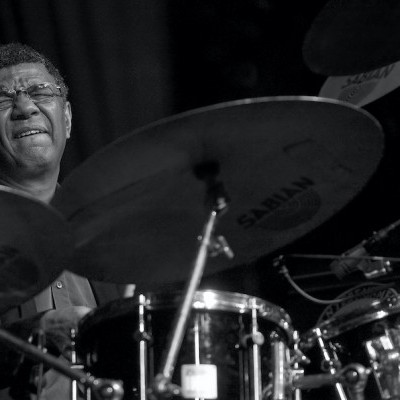
Jack DeJohnette boasted a musical resume that was as long as it was fearsome.
Oct 28, 2025 10:47 AM
Jack DeJohnette, a bold and resourceful drummer and NEA Jazz Master who forged a unique vocabulary on the kit over his…
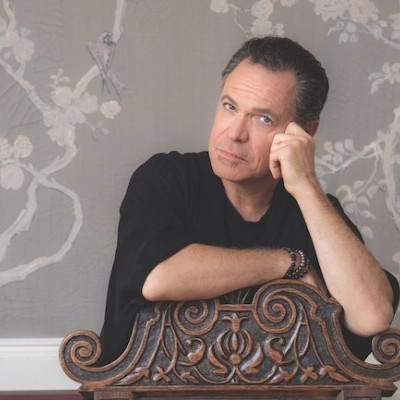
“Think of all the creative people I’m going to meet and a whole other way of thinking about music and a challenge of singing completely different material than I would have sung otherwise to my highest level in dedication to the moment,” Elling says about his Broadway run.
Sep 9, 2025 1:18 PM
Kurt Elling was back at home in Chicago, grabbing some family time in a late-June window between gigs. Sporting a smile…
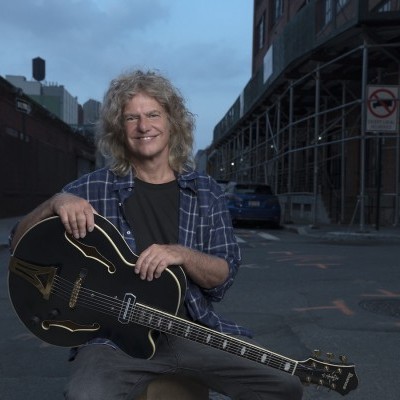
Pat Metheny will perform with his Side-Eye III ensemble at Big Ears 2026 in Knoxville, Tennessee, next March.
Sep 9, 2025 12:19 PM
Big Ears has announced the lineup for its 2026 festival, which will take place March 26–29 and include 250…
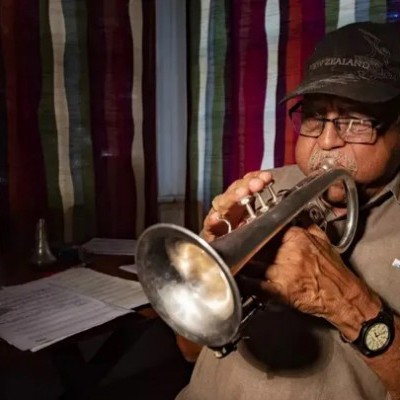
“[That’s] the thing of the beboppers,” Bradford said. “These guys were important for not only playing that wonderful music, but they knew a sort of social stance, you see?”
Sep 9, 2025 1:07 PM
It was a calm, balmy, near-perfect evening in Westwood, California, not far from UCLA, in the expansive courtyard at…
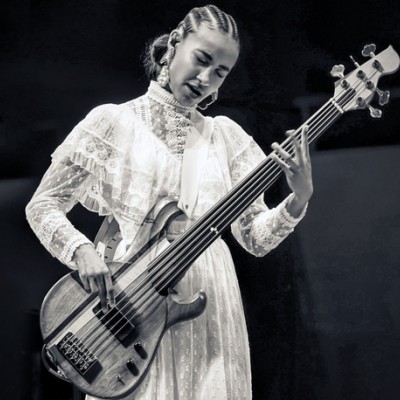
Esperanza Spalding closed an audacious Chicago Jazz Festival set with “Endangered Species.”
Sep 9, 2025 11:50 AM
The 45th Chicago Jazz Festival kicked off its headline events with two erudite individuals, Esperanza Spalding and…